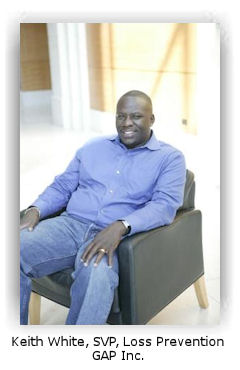|
|

By Jennifer Overstreet
Published April 29, 2013
 Earlier
this month, we introduced our series on the evolving careers of
retail loss prevention leaders, asking Dan Faketty of Winn-Dixie to
share his career
story. To get another perspective for our second installment, we
asked the same of another stand-out leader from our
LP Advisory Council,
Keith White. Earlier
this month, we introduced our series on the evolving careers of
retail loss prevention leaders, asking Dan Faketty of Winn-Dixie to
share his career
story. To get another perspective for our second installment, we
asked the same of another stand-out leader from our
LP Advisory Council,
Keith White.
White is the senior vice president of loss prevention at Gap Inc.,
vice chairman of the
LP Advisory Council, and a speaker at our upcoming
Loss Prevention Conference & EXPO. Read on to find out how he
views the profession, how growing up in inner city Chicago gave him
an edge in the industry, and what the LP profession needs today.
When were you first exposed to the loss
prevention profession? What made you decide to pursue a career in
loss prevention/asset protection?
Like a number of people in the field, I discovered it by accident.
After finishing college, I was looking at law enforcement
opportunities. A friend told me about an loss prevention job
interview he had and asked if I wanted to interview in his place. I
said, “what’s loss prevention?” I knew about corporate security, but
I wasn’t impressed with being limited to a uniformed guard. I had no
idea that loss prevention would be so vast and sophisticated. For me
it was the perfect intersection between the investigative training
and business acumen I had developed at the collegiate level. I could
carry a briefcase, manage a team, oversee a budget and manage
business objectives, but I would also have the opportunity to
testify in court and manage complex, interesting investigations —
everything I like to do.
How has your unique personal background
helped you succeed in your LP career?
When you live in the inner city, you have to be extremely perceptive
and aware of your surroundings. You have to be able to sense when
there is a change in the atmosphere, whether it’s in the personal
relationships of those around you or the physical environment. If
someone has to tell you something’s not right, then it’s too
late—you’re robbed or worse. I think that being perceptive,
understanding how to read people, understanding body language and
being able to evaluate all kinds of situations has given me a
distinct advantage in this role and in all my LP roles.
Tell us about a particular moment,
challenge or success that made you certain this was the right
profession for you.
I started my career in a distribution center environment, and I got
a confidential tip that a receiving dock worker and truck driver
were colluding to steal a truckload of swimming pools and fans. I
connected with the local PD and we set up an elaborate sting
operation to catch them in the act. I learned a lot from that.
First, that people always think people steal things like
electronics, but that was one of the hottest summers on record and
pools and fans were selling like hotcakes, so you have to understand
the full context of the environment you’re engaged in.
And second, in setting up that sting with the police, I gave up some
control over the investigation. And because union members were
involved, it was a political disaster that some of my superiors
didn’t want me to pursue. But I told them that the sting is going
down, and I’m going to be there – if I’m not here tomorrow, that’s
on you. Well, the sting went down like in a textbook. The
apprehensions went down perfectly. And then, my boss said, “look
what Keith and I did.” It was a laughable moment, but I knew that I
was in this career for the long-haul. I stand for what’s right, not
what’s politically correct. Being an authority figure, we sometimes
get involved in situations that don’t win popularity contests, but I
knew I’d be OK doing that.
The role of LP is continuing to expand and
grow. When it comes to hiring and promoting team members, what kind
of talent and skill sets are you looking for to be successful now
and in the future?
In the old days, there were two ways to look at LP. If you’re
looking for a management candidate, you were looking for someone who
had a law enforcement background with investigative experience. And
for an hourly level employee, you were looking for physical
presence, what we called the big dude in the door.
Now, for management candidates, I’m looking for someone who has an
academic background in criminal justice or law and even an M.B.A. or
business background because I want someone who can apply concepts
and strategies within a business framework. For those hourly
associates, physical presence is not what it used to be. I look for
people who can outthink a shoplifter or a criminal, not out-wrestle
them or outrun them. If there’s a 5’1” woman who can educate the
staff, build awareness, create a shrink-reduction strategy for the
store and understand all the technical tools at her disposal, she’ll
do 20 times more than the big dude at the door ever could. So we’re
looking for people with those ambitions and qualifications.
Stay tuned for the last post in our series, where Gary Johnson, vice
president for loss prevention at The Vitamin Shoppe Inc., will share
his story.
This article was published by and recently appeared
in LP portion of
Retail's BIG blog, a part of the National Retail Federation's
(NRF) website. An excellent resource for LP executives to
incorporate in your quest for information and education of the LP
industry. This is an industry leading publication and one of the
best, if not the best, resource for industry leading, thought
provoking material that you need to use as you continue to build
your career.
|
|
|

What's Happening?
Coming soon:
Mobile App's
LP Show Coverage
The Top 10
|
|